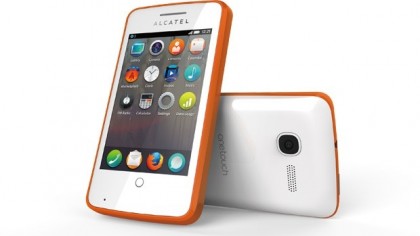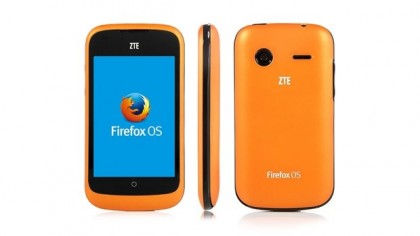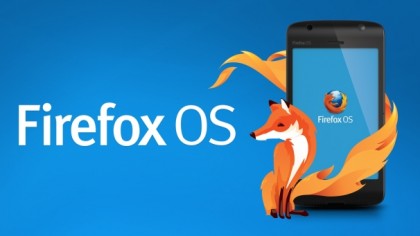Firefox OS: could your next smartphone cost just $25?
Can Mozilla's spark grow into a flame?
Sign up for breaking news, reviews, opinion, top tech deals, and more.
You are now subscribed
Your newsletter sign-up was successful
Starting small
But even with all the positive aspects of Firefox OS it's not really ready to take on Android and iOS. Both of those operating systems have been around for years and gone through numerous changes, while Firefox OS is only on version 1.2.
It also has far fewer apps than either of the big two and so far it's only available for a handful of phones, most of which are pretty low end.
So it's not likely to tempt too many consumers on these shores in its current state, but then it's also not easily available in many of the more developed smartphone nations yet and that's a very conscious decision from Mozilla.
Smartphones are enormously popular in the UK, for instance, where 62.2% of the population has one according to a study by Statista. Disposable incomes are higher too, so expensive flagship phones are in great demand and the super-cheap aspirations of Firefox aren't being touted beyond finding some hardware available on eBay.

As such it's incredibly unlikely that Firefox OS could make much headway in this area, with users entrenched in iOS and Android and looking for high end handsets.
It's a similar story in the US and other wealthy nations, which is why Firefox OS is not available in them for the most part either. But there are some parts of the world where it's a very different story.
In Peru, for example, smartphone penetration stands at just 17%, according to a study by Ipsos Peru, leaving the vast majority of its 30,475,144 strong population without a handset and likely to be more open to an iOS and Android alternative.
Sign up for breaking news, reviews, opinion, top tech deals, and more.
This is true when you consider the availability of very affordable phones such as the ZTE Open and could soon be available for phones which cost as little as $25, which puts it in direct competition with the feature phone price range.
- Just because it's cheap, doesn't mean it's great though: check out our hands on: ZTE Open C review to see what we thought of the new hardware.
In case you haven't guessed, Peru is one of the places where you can currently buy Firefox OS phones, showing Mozilla is instead trying to capture new and developing markets where the fact that it's so new won't be such a problem and the fact that it's affordable will be a huge advantage.
With Firefox OS running on just 128MB of RAM it's going to be an appealing option for both customers and manufacturers, who can squeeze the OS into increasingly cheap handsets.

In an interview Mozilla's Head of Engineering, Jonathan Nightingale, told us that "our CEO talks about how we're going to have 2 billion people joining the web for the first time and we've got about two billion on the web now, so the two billion coming in is going to look really different.
"A lot of people are asking whether Firefox OS is designed for the emerging market and whether that's our segment. Certainly, that's an important place for us to be. We're non-profit, we're mission driven so we look at it and think, if those people are coming online, they're not going to be doing it on a $700 smartphone. We have a real opportunity to introduce something there."
By focusing on developing markets Mozilla is also working towards its goal of bringing the web to more people, as it will get internet enabled phones into the hands of those who may never have owned a smartphone or computer before.
It's a strategy mirrored by the likes of Nokia, which has had plans to build phones that connect the next billion users to the internet and explains why it's adding a version of Android (with the Nokia X) to its range to service this market segment which has access to 3G but no fixed landlines.
Other brands, such as Sony, Huawei, LG and Alcatel are all getting behind the open OS, committing to launching hardware with a smattering of devices in the market, with more to come. It's not a huge, sweeping effort to enter the market, but shows that there is at least some intrigue there.
So far things seem to be going according to plan for Mozilla's new OS, as back in October it was reported by Telefonica that Firefox OS accounted for more than 12% of smartphone sales in Venezuela and almost 9% in Colombia.
Onwards and upwards
Ultimately, once the OS matures (assuming it survives that long), there's every chance that it will spread to the UK and beyond and until it has matured you probably won't want it anyway.
Even if or when it does go global Mozilla doesn't necessarily need it to compete with Android and iOS.
As a non-profit organisation it doesn't need to be number one, all it needs is for enough people to be using Firefox OS that it's a known entity and that developers are making a large number of applications for it, applications which can then be run on other devices, keeping the mobile web open and accessible, which are two of the key stated goals in Mozilla's Manifesto.

Firefox OS's use of HTML5 should make it easier for developers to get on board too as many will already know HTML5 and won't have to learn a new programming language. In the words of Nightingale: "There's 200,000 iOS developers, 600,000 Android developers and there's 8 million web developers out there. If you're not betting on HTML5, you're making a mistake."
But Firefox OS isn't even just about phones. Panasonic for example plans to use Firefox OS in some of its smart TV's, while in the future Mozilla wants to see Firefox OS and the principles of openness that come with it make their way to smartwatches, cars and anything else with an internet connection.
As Firefox OS is an open source system that other companies and individuals are allowed to adapt and use for their own purposes there's no reason it couldn't power stereos, fridges, vacuum cleaners and just about anything else in the future. In fact it's ideally positioned to capitalise on the ever growing number of smart devices.
There's no doubt that it has an uphill struggle, but by taking a different, altogether more altruistic approach to things Mozilla and its Firefox OS might just stand a chance, particularly in developing nations.
But with its focus firmly on the low-end of the market for now it's unlikely to be making waves in the more developed nations for the next few years - then again, at such a low cost, it's not unfeasible even now that you could pop online and buy an unlocked handset running the platform instead of upgrading to that hyper-expensive flagship model.
- Firefox OS isn't the only mobile upstart. Tizen is looking for a slice of the pie too.
James is a freelance phones, tablets and wearables writer and sub-editor at TechRadar. He has a love for everything ‘smart’, from watches to lights, and can often be found arguing with AI assistants or drowning in the latest apps. James also contributes to 3G.co.uk, 4G.co.uk and 5G.co.uk and has written for T3, Digital Camera World, Clarity Media and others, with work on the web, in print and on TV.